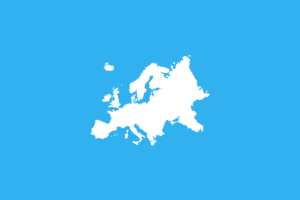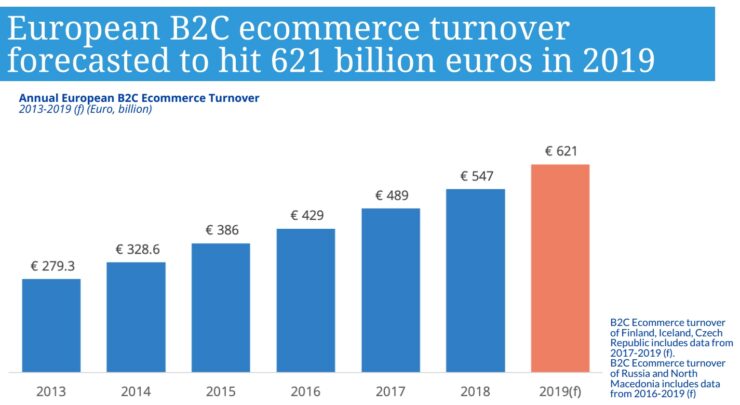Ecommerce in Europe: €621 billion in 2019

Ecommerce in Europe is forecasted to be worth 621 billion euros by the end of 2019. This would mean an increase of 13.6 percent compared to the situation last year, when ecommerce was worth 547 billion euros.
The prediction comes from the latest Ecommerce Foundation report on ecommerce in Europe. This study also found that Scandinavian countries keep ranking high in important ecommerce indices. For example, Denmark is the highest-ranked country in Europe when it comes to the ease of doing business, while Sweden, Denmark and Finland can all be found in the top 10 of the global Logistics Performance Index.
Share of European consumers who shopped online
The share of consumers using the internet who shopped online in the last year varies per country. In Switzerland, the United Kingdom and Denmark it’s over 85 percent, while in countries such as Romania and Ukraine, less than 26 percent shopped online last year.
European ecommerce grows 13 percent
As said, the European business-to-consumer ecommerce turnover is forecasted to hit 621 billion euros this year. If this comes true, ecommerce in Europe continues to grow at over 13 percent. According to the Ecommerce Foundation, most ecommerce turnover is concentrated in Western Europe (66 percent). Eastern Europe however only accounts for 23 billion euros of the total of 547 billion euros.

Average online shopper spending in Europe
Although in Western Europe, the highest share of the continent’s ecommerce turnover is generated, Northern Europe is the region with the highest spending per online shopper: 2.046 euros per year. The average online shopper spending in the whole of Europe was 1,346 euros last year and is forecasted to grow to 1,464 euros by the end of this year.
Internet penetration in Europe
In Europe, the internet penetration is at 82.5 percent, with Northern and Western Europe being the regions with the highest internet penetration (respectively 93.3 and 92.3 percent). There are still many big differences between European countries when it comes to this subject. For example, Iceland has an internet penetration of 99 percent, while in Ukraine just 64 percent of the population has access to the internet.
Although many consumers in Europe like to shop online, there will of course always be consumers who prefer to shop in person, like to see the product, are loyal to shops or because of a force of habit. In Kosovo and Montenegro, people are more likely to refrain from ordering online, while in Poland only 2 percent prefer physical stores over online stores. And in Denmark (11 percent), the Netherlands (11 percent) and the United Kingdom (10 percent) a similar thought is shared.

Comments